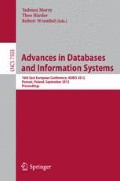Abstract
In this paper we present GOSPL, which stands for Grounding Ontologies with Social Processes and Natural Language. GOSPL is a method and tool that supports stakeholders in iteratively interpreting and modeling their common hybrid ontologies using their own terminology for semantic interoperability between autonomously developed and maintained information systems. Hybrid ontologies are ontologies in which concepts are both formally and informally described with the help of a special linguistic resource called glossary. Social interactions between the community members drive the ontology evolution process and result in more stable and agreed upon ontologies.
Access this chapter
Tax calculation will be finalised at checkout
Purchases are for personal use only
Preview
Unable to display preview. Download preview PDF.
References
Bergman, M.: A brief survey of ontology development methodologies (2010), http://www.mkbergman.com/906/a-brief-survey-of-ontology-development-methodologies/
De Leenheer, P., Christiaens, S., Meersman, R.: Business semantics management: A case study for competency-centric HRM. Computers in Industry 61(8), 760–775 (2010)
De Leenheer, P., Debruyne, C.: DOGMA-MESS: A Tool for Fact-Oriented Collaborative Ontology Evolution. In: Meersman, R., Tari, Z., Herrero, P. (eds.) OTM-WS 2008. LNCS, vol. 5333, pp. 797–806. Springer, Heidelberg (2008)
De Leenheer, P., Debruyne, C., Peeters, J.: Towards social performance indicators for community-based ontology evolution. In: Workshop on Collaborative Construction, Management and Linking of Structured Knowledge (CK 2008), Collocated with the 8th International Semantic Web Conference (ISWC 2009), CEUR-WS (2009)
de Moor, A., De Leenheer, P., Meersman, R.: DOGMA-MESS: A Meaning Evolution Support System for Interorganizational Ontology Engineering. In: Schärfe, H., Hitzler, P., Øhrstrøm, P. (eds.) ICCS 2006. LNCS (LNAI), vol. 4068, pp. 189–202. Springer, Heidelberg (2006)
De Nicola, A., Missikoff, M., Navigli, R.: A software engineering approach to ontology building. Information Systems 34, 258–275 (2009)
Debruyne, C., Meersman, R.: Semantic Interoperation of Information Systems by Evolving Ontologies through Formalized Social Processes. In: Eder, J., Bielikova, M., Tjoa, A.M. (eds.) ADBIS 2011. LNCS, vol. 6909, pp. 444–459. Springer, Heidelberg (2011)
Fernández-López, M., Gomez-Perez, A., Juristo, N.: METHONTOLOGY: from ontological art towards ontological engineering. In: Proceedings of the AAA I997 Spring Symposium, pp. 33–40 (1997)
Gómez-Pérez, A., Fernández-López, M., Corcho, O.: Ontological Engineering with examples from the areas of Knowledge Management, e-Commerce and the Semantic Web. Springer-Verlag New York, Inc., Secaucus (2003) ISBN: 1852335513
Gruber, T.: Toward principles for the design of ontologies used for knowledge sharing. International Journal of Human-Computer Studies 43, 907–928 (1993)
Guha, R., Lenat, D.: Cyc: A midterm report. AI Magazine 11(3), 32–59 (1990)
Halpin, T.: Information Modeling and Relational Databases. Morgan Kaufmann, San Francisco (2008)
Holsapple, C.W., Joshi, K.D.: A collaborative approach to ontology design. Commun. ACM 45, 42–47 (2002)
Karapiperis, S., Apostolou, D.: Consensus building in collaborative ontology engineering processes. Knowledge Creation Diffusion Utilization 1(3), 199–216 (2006)
Kotis, K., Vouros, A.: Human-centered ontology engineering: The hcome methodology. Knowledge Information Systems 10(1), 109–131 (2006)
Liapis, A., Christiaens, S., De Leenheer, P.: Collaboration across the enterprise - an ontology-based approach for enterprise interoperability. In: Cordeiro, J., Filipe, J. (eds.) ICEIS, vol. 4, pp. 255–262 (2008)
Meersman, R.: The use of lexicons and other computer-linguistic tools in semantics, design and cooperation of database systems. In: Zhang, Y., Rusinkiewicz, M., Kambayashi, Y. (eds.) The Proceedings of the Second Int. Symposium on Cooperative Database Systems for Advanced Applications (CODAS 1999), pp. 1–14. Springer (1999)
Simperl, E., Tempich, C.: Ontology Engineering: A Reality Check. In: Meersman, R., Tari, Z. (eds.) OTM 2006. LNCS, vol. 4275, pp. 836–854. Springer, Heidelberg (2006)
Siorpaes, K., Simperl, E.: Human intelligence in the process of semantic content creation. World Wide Web 13(1-2), 33–59 (2010)
Tudorache, T., Noy, N.F., Tu, S., Musen, M.A.: Supporting Collaborative Ontology Development in Protégé. In: Sheth, A.P., Staab, S., Dean, M., Paolucci, M., Maynard, D., Finin, T., Thirunarayan, K. (eds.) ISWC 2008. LNCS, vol. 5318, pp. 17–32. Springer, Heidelberg (2008)
Uschold, M.: Building ontologies: towards a unified methodology. In: 16th Annual Conference of the British Computer Society Specialist Group on Expert Systems, pp. 16–18 (1996)
Uschold, M., Grüninger, M.: Ontologies: principles, methods, and applications. Knowledge Engineering Review 11(2), 93–155 (1996)
Verheyden, P., De Bo, J., Meersman, R.: Semantically Unlocking Database Content Through Ontology-Based Mediation. In: Bussler, C.J., Tannen, V., Fundulaki, I. (eds.) SWDB 2004. LNCS, vol. 3372, pp. 109–126. Springer, Heidelberg (2005)
Vrandecic, D., Pinto, H.S., Sure, Y., Tempich, C.: The DILIGENT knowledge processes. Journal of Knowledge Management 9(5), 85–96 (2005)
Wintraecken, J.: The NIAM Information Analysis Method, Theory and Practice. Kluwer Academic Publishers (1990)
Author information
Authors and Affiliations
Editor information
Editors and Affiliations
Rights and permissions
Copyright information
© 2012 Springer-Verlag Berlin Heidelberg
About this paper
Cite this paper
Debruyne, C., Meersman, R. (2012). GOSPL: A Method and Tool for Fact-Oriented Hybrid Ontology Engineering. In: Morzy, T., Härder, T., Wrembel, R. (eds) Advances in Databases and Information Systems. ADBIS 2012. Lecture Notes in Computer Science, vol 7503. Springer, Berlin, Heidelberg. https://doi.org/10.1007/978-3-642-33074-2_12
Download citation
DOI: https://doi.org/10.1007/978-3-642-33074-2_12
Publisher Name: Springer, Berlin, Heidelberg
Print ISBN: 978-3-642-33073-5
Online ISBN: 978-3-642-33074-2
eBook Packages: Computer ScienceComputer Science (R0)

